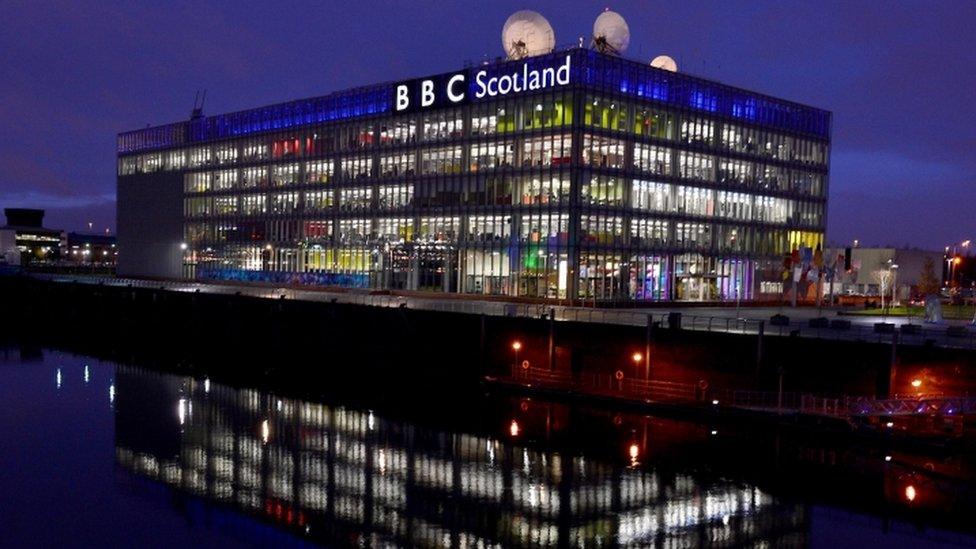Fiona Hyslop says BBC 'must catch up with devolution'
- Published

The Scottish government believes BBC Scotland should be given a far greater share of the overall BBC budget
The BBC needs to catch up with devolution and give its Scottish operation greater control of budgets, staffing and decision making, Scotland's culture secretary has said.
Fiona Hyslop was speaking as she outlined the Scottish government's vision for the future of the BBC after the current review of its charter.
The Scottish government has been given a formal role in the charter process.
It is currently consulting on its vision for the future of the BBC.
As part of the process, Ms Hyslop recently met UK Culture Secretary John Whittingdale, and James Purnell, who is leading the review for the BBC. She is also due to meet BBC director general Lord Hall next month.
Mr Whittingdale has said the charter review will look at whether the broadcaster should continue to be "all things to all people" or have a more "precisely targeted" mission.
Lord Hall promised an "open BBC" that collaborates with rival media and the public, and serves as a "catalyst for this country's incredible talent", in his initial response to the UK government's review of the BBC's royal charter, external.
The Scottish government wants the review to allocate a greater share of the overall BBC budget to BBC Scotland, and for an additional Scottish TV channel and radio station to be developed.
Under its proposals, budgets would be transferred to BBC Scotland to allow "independent decision making" in relation to commissioning and editorial decisions, as well as staffing structures and the wider running of the broadcaster.
This would enable BBC Scotland to directly commission programmes, which Ms Hyslop believes would help to support the creative industries in Scotland.
She has argued that this would not require new money, but merely a re-allocation of existing funding,
Ms Hyslop also outlined proposals for the BBC to operate under a federal structure, with boards made up of BBC staff and independent members operating in Scotland, Wales, England and Northern Ireland.
'Truly radical'
She said: "The UK has changed dramatically since devolution but the BBC has yet to catch-up with the impact of devolution and truly reflect the complex, varied and rich realities of our society.
"Scotland has the right to expect something truly radical from the Charter review, if the BBC is to meet the needs and reflect the lives of Scottish audiences to support the development of a sustainable production sector in Scotland.
"My ambition on this journey is a destination that sees the BBC in Scotland delivering a public service both in how it does its business as well as the high quality and meaningful content experienced by audiences.
"I want to see content that is genuinely representative and empowers and inspires debate, from Selkirk to Shetland, from Paisley to Portree."
Ms Hyslop was speaking at a consultation event in Glasgow, which saw leading figures from Scotland's TV sector meet to discuss the possibilities of charter renewal and how to work together to support the BBC as a "quality public sector broadcaster meeting the needs of Scotland".
Speaking at the same event, BBC Scotland's head of public policy, Ian Small, said the corporation shared the ambitions of Scotland's creative sector.
'Quality and quantity'
He added: "The BBC's charter document offers a vision of what the BBC could, and indeed should, look like in the years to come - open, creative, distinctive and one where audiences have a much more personal relationship with us a broadcaster.
"We want to improve the quality and quantity of our output, we want to help grow the production sector, we want to encourage innovation and investment and we want to help skill and train the next generation of journalists, of young programme makers, of writers and producers."
The BBC's Charter proposals for the future, he said, will add to that existing output and will include a number of pan-UK initiatives that both BBC Scotland and the industry in Scotland will benefit from.
These include The Ideas Service, which will bring content from the BBC and partners such as The Royal Conservatoire, Creative Scotland and MG ALBA together in one online place; a digital iPlay platform which will offer access to the vast range of BBC Children's output; and ongoing investment in British drama and comedy.
Scottish Labour's Claire Baker said: "It is important that we have a sustainable BBC in Scotland where skills are harnessed, jobs are secured and high-quality programmes are produced.
"That is why Scottish Labour is calling for increased investment for BBC Scotland and for retaining and improving the quotas system for commissioning.
"Whilst we will be laying out Scottish Labour's view on the BBC's future in the weeks ahead, it is vital that this Charter Renewal process is driven by the public, not politicians, and secures the best deal for licence-fee payers and the creative industries in Scotland."
And Scottish Conservative culture spokeswoman Liz Smith said: "The SNP cannot make their mind up about the BBC. The constantly complain about skewed coverage of Scottish issues, yet are happy to demand more money for Scotland.
"The Scottish Government loves to use the BBC as a political football to fight its own separation agenda, and it seems this is another example of that."